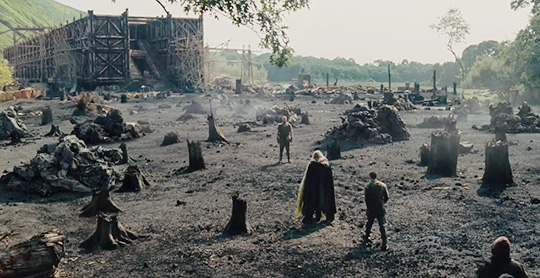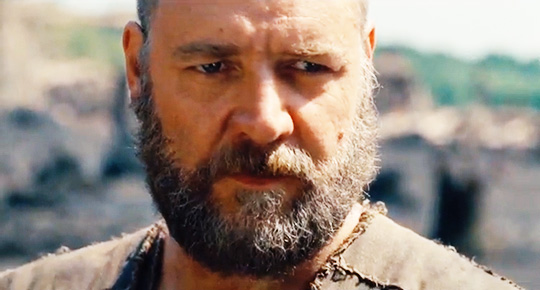»I'm not alone!«
A review by Timo Roller, Germany, #NoahResearcher
31 March 2014
The new film »Noah« by Darren Aronofsky has many critics among Christians. My opinion is a little bit different.
»I have men in my back and you stand alone and defy me?« – »I'm not alone!« Russell Crowe as Noah stands before enemy adversary Tubal-Cain ( Ray Winston ) and knows about God's protection for himself and his family. Really? This is how you probably think when watching the trailer of the newly released movie »Noah«, that starts in German cinemas on April, 3rd.
But God is far away and silent in this Noah movie. He is simply called »the Creator« and Noah gets his Holy task my horrible dreams and visions. One of the visions is even initiated by a tea from his grandfather Methuselah. A witch's brew ? A drug cocktail? Played by Anthony Hopkins this oldest person in the Bible brings a touch of humor into the film. Not as much as in the pre-released comics he is a somewhat mysterious magician, but more a wise old man than a witch doctor. Perhaps those theological advisors hat a little influence on the final product done by the filmmakers. And yet the story corresponds very much the comic book version, thus deviating obviously from the literal report in the book of Genesis. But nevertheless some details are very accurate: The Methuselah in the film dies just by being flushed away in the moment when the waters of the Flood arrive, which in fact can be derived from the Masoretic text of the Bible: 187 (Methuselah fathered Lamech) + 182 (Lamech fathered Noah) + 600 (age of Noah when the Flood arrived) results in 969 (overall age of Methuselah)! Perhaps Methuselah died actually in the waters of the Flood.
Noah is alone. The silence of God during the flood changes Noah: He is no more a caring father and nature-loving vegetarian but a becomes an eager Ark captain who has to fulfill his »godly« task at any price, even by risking the disintegration of his family.
»I'm not alone« – the biggest surprise of the unprepared audience may certainly be the appearance of the »Watchers«. After Noah speaks that crucial objection against Tubal-Cain and his armies, those giants come to life and helps him defending the ark. It's not the help of God but of those fallen angels, the Nephilim. Being a rather unknown and hard to define part of the 6th chapter of Genesis, director Aronofsky obviously refers to some apocryphal Jewish works, that explain the appearence of these »Nephilim« in detail.
The »Watchers« are hidden very well in every trailers I have seen before the release of the movie an one might wonder why Paramount Pictures made such a secret of them. Perhaps it's too strange to a Christian audience and were afraid of even harsher critics. Aronofsky himself has never made sucha secret of this element of his story: Both in the comics to film as well as in his Twitter tweets they appeared frequently. So I was not too surprised when they appeared on the screen, although they bring a quite outlandish fantasy element into the biblical story. However, Aronofsky solved two problems by using the giants: They support the Noah family to construct the Ark and also defend it against Tubal-Cain and his warriors. »I'm not alone!«

It is a crucial point in the film when Noah lurks into the enemy's settlement to search for wives for his younger sons, Ham and Japheth. Initially he understood his task right as depicted in the Bible: To save all species and his own human family to repopulate after the Flood. But now he experiences the wickedness of the people firsthand who sacrifice their own children just for getting meat. Contrary to some impeachments, Aronofsky didn't make a pure ecological apocalypse story out of the Flood story. He also has the disappearance of humanity and the revolt and rebellion against God in his movie. Sin against creation AND against the creator. Tubal-Cain himself conceives his role not only as an image of God, but as equal with his creator – a ruler upon life and death.
Now Noah returns to the ark and his perspective to the task has changed. He recognized that evil is inside of all mankind (which is a very biblical point of view). He comes to the conclusion that his family is now only purposed to save the animals and lead them into a new beginning without humans. The creation could unfold in a better way without mankind. To Japhet he says: »You will be the last man.«
God remains silent and Noah changes towards a very lonely and hard-hearted patriarch, his wife and his daughter Ila are not able to change his mind. A pregnancy, a lifeboat and a stowaway are elements of the drama to develop on board of the Ark. The writers of »Noah« used their fanciful imagination to fill this long time of which the bible is silent about with life and tension. The sympathy of the audience for Noah disappears more and more, they might fear how this might finally end. The actors are impressive. A reference to the story of Abraham leads to the dramatic climax of the story. And now finally mercy prevails upon remorselessness and the white dove with an olive branch comes just in time. A sign from God after a grave and lonely decision.
After the flood Noah's is exhausted, beastly drunk and naked before his sons. So the film contains this darkest chapter in the story of Noah from the bible. After all struggles that have taken place on the Ark within Noah's family an within his heart, this deep depression is reasonable. And yet humanity returns, reconciliation and hope for a better new world. What bothered me most was Ham who then leaves his family without a woman. Here is a missing link to the story after the flood, the spreading and multiplying of the people according to Genesis 10. The absence of the two wives for Ham and Japheth, which are only just born as twin daughters of Shem, is in my eyes is the greatest weakness of Aronofsky's narrative.
How do I now evaluate this movie out of a Christian point of view? The unfolding of Noah's character is disturbing. But is this unknown perspective also unbiblical? Noah is mentioned in Hebrews 11 as a great hero of faith of course. But like Abraham, Moses or David he may also have had his dark hours. He surely was a sinner before God.
»I'm not alone« – Noah in the movie is alone for a long timeframe. Abandoned from God, from his wife, from his children. An oppressive character study that possibly can show us just how difficult it is sometimes for us to be aware of the presence of God.

Many American Christians reject the movie with harsh words and warned church people to watch it. In many conent-related points they are surely right. But they also write, the movie is »sci-fi fantasy«, »a mockery of the Word of God«, »an insult to Christians« and even »the worst film I've ever seen«. Really?
Am I so wrong when these words remind me on Russell Crowe's Noah? The cold-hearted and eager one? Where is the mercy, compassion and love, so tangently presented by Jennifer Connelly as Noah's wive? These attributes gain the upper hand at the crucial moment in the film. Wouldn't it be fair to show such attributes when judging a film like this as a follower of Jesus and a lover of the Bible?
Those who know Darren Aronofsky's earlier films – »The Fountain« or »Black Swan« – could easily anticipate that this filmmaker can not be a missionary. He is not even a teacher. He is a narrator, a very emphatical one. Maybe he also is a searcher and a learner. In addition to some environmental organizations it seems some of his inspiring sources are the Dalai Lama and the Pope. For one who is obviously not a believer (Aronofsky is considered to be an atheist, though born into a conservative Jewish family), he takes the Bible very seriously as the main inspiration for his movie. For example the construction of the film's Ark is nearly a literal implementation out of the book of Genesis.
Even if we as Christians know that Jesus is the truth and the saving Ark in the forsakenness of our time, we should not presume to have found the only correct answer for each single question. God is always greater, deeper and more merciful than we can imagine. And we ourselves are so often not.
I do not interpret this film as a political or ecological statement primarily. I think it is a very serious and a very individual examination with one of the most important stories of humanity. With a sacred history. Possibly it may be a search for God himself, who for the filmmakers might seem so far away, as he is presented in the movie. Perhaps they got one step closer to him.
My research on the Noah's Ark and other biblical subjects have reinforced my belief that the Bible is God's true word. It is historically reliable, contains numerous prophecies that have been fulfilled, and its estimation of our human character is true and clear. Therefore I know, that also the message of the Bible is true: God wants to be found by us. »Seek, and you will find« (Matthew 7:7). As a believer I can say: »God is with me« – »I'm not alone!«